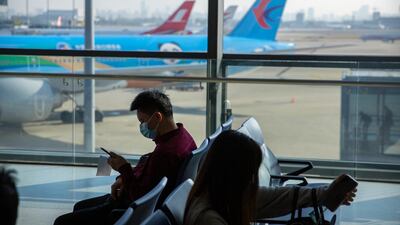Eight in 10 airline passengers across the globe do not expect to return to their previous travel routines post-Covid-19, a new study showed.
A total of 83 per cent of the 10,000 frequent flyers polled by London-based Inmarsat said they do not intend to resume their travel regime even after the virus is under control, with 31 per cent planning to travel less frequently by air.
“With safety and reputation becoming even more important to today’s flyers, there is a clear need for airlines to differentiate themselves in order to encourage passengers back onto their flights," said Philip Balaam, president of Inmarsat Aviation, a global mobile satellite communications company.
Only a third of passengers have taken a commercial flight since the pandemic began, Inmarsat's Passenger Confidence Tracker found, with 41 per cent now expecting to travel less by any means of transport.
Looking closer at individual countries, 90 per cent of UAE residents said they will change their flying habits and routines after the pandemic is over, while 58 per cent of passengers in India and 55 per cent in South Korea are also planning to travel less in future.
At the start of the pandemic, international borders closed and businesses and schools were forced to shut to help contain the spread of the outbreak. While these restrictions have eased in some parts of the world, several countries in Europe are now enduring a second lockdown, albeit with slightly less prohibitive measures.
What the lockdowns illustrated, however, was that the majority of business can be conducted virtually, which in turn saw companies slash expense budgets, including travel, as they tried to survive the economic fallout of the Covid-19 crisis.
“We’ve sat in our houses for a long time, we’re very used to doing business virtually now,” said Chris Rogerson, vice president of global sales at Inmarsat.
“Business travel will come down a little bit as we get used to these interactions being more digital, and airlines will have to adapt to this.”
A "staggering" 174 million travel and tourism jobs could be lost worldwide this year if current global travel restrictions continue, the World Travel & Tourism Council said last month, warning that prolonged barriers could eliminate $4.7 trillion of the sector's contribution to gross domestic product.
Meanwhile, airports' body ACI Europe said an estimated 193 European hubs face going bust as a result of the pandemic.
Despite this shift in attitude towards flying, there are signs that some travellers are beginning to feel confident about flying again, with almost half of passengers surveyed expecting to feel ready to fly within the next six months.
Hungarian and British fliers are the most confident, with 26 per cent and 16 per cent respectively saying they would get on a flight today. Asian passengers are less so; more than a third of South Koreans do not expect to fly again until Covid-19 is eradicated.
Meanwhile, 60 per cent of passengers said they are satisfied with the aviation industry’s response to the challenges of Covid-19.
Interestingly, UAE passengers are more likely than their global counterparts to have taken a flight since the pandemic, with almost half of those polled boarding at least one flight – the third highest rate after India and the US.
“While UAE passengers are eager to return to travelling, the findings reveal their concerns around points of engagement and the in-flight experience," said Neale Faulkner, Inmarsat Aviation’s regional vice president for the Middle East, Africa and South Asia.
"This shows a clear opportunity for airlines to provide new digital services — from medical support to pre-ordered catering and contactless payment during the flight — to boost passenger confidence, while making sure health and safety needs can be fully met.”


